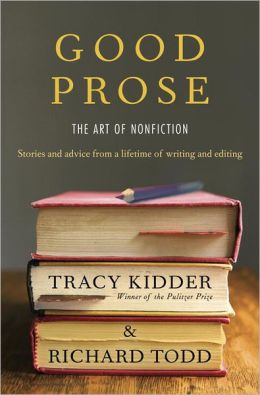
What I wouldn’t give to be in the room as writer Tracy Kidder and editor Richard Todd hash out ideas for books and magazine articles, and go through the entire process from start to finish, when they read out the work together in a final run-through before publication. In reality, it would probably be boring. I know that. But as captured in their new book — Good Prose: The Art of Nonfiction — the partnership between writer and editor is so pitch-perfect, and so collaborative, that one feels sad to realize that that not every writer probably has that kind of relationship with an editor.
While Good Prose does center on advice for writing non-fiction — ranging from topics of telling the truth to structural decisions around longer narratives to the ways writers use language for effect — I found the sections where Kidder, a Pulitzer Prize winning writer (for Soul of a New Machine, about the very beginning of the computer revolution), and Todd, his editor and a writer himself, share words about their relationship as collaborators over four decades, and offer an insider’s glimpse into the way Kidder writes, to have been the best parts of an excellent book.
I should note a few things here. First, I have met Kidder before. He lives in our neck of the woods, and when he was doing research for his book, Hometown, he was sitting in the same meetings and watching the same news unfold as I was, in my role as a newspaper reporter. I won’t say he would know me if he saw me (he wouldn’t) but I have had a keen interest in Kidder for a number of years, as one often does with local authors who have won the Pulitzer Prize. That said, I have not always found his writing to be my style. There’s something about his books that removes the reader from the emotional center of the story, in my opinion. Even the book I thought I would love – Among Schoolchildren — didn’t quite touch me the way I thought it would. I did enjoy Mountains Beyond Mountains, however, and I realized as I read Good Prose why that is: Kidder injects himself into a first person narrative in the story of Dr. Paul Farmer. By doing that, he brought me, the reader, into the story with him. He closed the gap between reader and story. And I have met Richard Todd, too, as he is the father of a friend of mine, whose son (Todd’s grandson) is one my son’s best friends. We’ve never spoken more than a few words, however, and I never even knew he was Kidder’s editor.
My own difficulties with connecting to Kidder’s writing (and most people have nothing but praise for Kidder’s style) were not an issue here, as the vignettes and stories of researching and writing stories forms the heart of this book, and the two men do a fantastic job (Todd, in particular, has a fantastic way of telling a story with humor and English-style reservation, it seems to me). The craft of non-fiction goes deeper than I imagined, and I admire the kind of research and writing/revising/rewriting that Kidder undergoes to pull together a story from his notes. He admits he can spend a year or more rewriting draft after draft, trying to get it right. Todd’s role as arbiter of ideas, supportive friend, attentive reader is a crucial part of this relationship, as he guides Kidder forward along various paths.
If you are writer, or wish to learn more about the art of non-fiction, (or teach non-fiction writing) I’d suggest you go no further than Good Prose. It will invigorate you, and remind you that the act of writing — writing well, anyway — is a craft all unto itself, with decisions that will stake out a path forward for the story. The amount of dedication (and, as Kidder reminds us, sheer luck) it takes to succeed is difficult, but a worthy journey to undertake if you need to tell the story.
Peace (in the book),
Kevin







